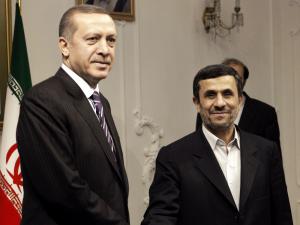
Turkish Prime Minister Recep Tayyip Erdogan meets Iranian President Mahmoud Ahmadinejad in Tehran, Iran, in March. Relations between the two countries have deteriorated over Iran's continued support of the Syrian regime.
Vahid Salemi / AP
PRESSURE POINTS
by Elliott Abrams
April 14, 2012
Happy talk is one of the great concerns we should all have about the talks with Iran in Istanbul, which just concluded with an agreement to meet again on May 23 in Baghdad. What happened in Istanbul? Judging from the account in The New York Times, not much. The EU’s Lady Ashton says the talks were “useful and constructive,” but there is no real reason to believe this. The Times continues:
April 14, 2012
Happy talk is one of the great concerns we should all have about the talks with Iran in Istanbul, which just concluded with an agreement to meet again on May 23 in Baghdad. What happened in Istanbul? Judging from the account in The New York Times, not much. The EU’s Lady Ashton says the talks were “useful and constructive,” but there is no real reason to believe this. The Times continues:
The decision to meet again appeared to reflect what European and American officials saw as a serious commitment from Iran to negotiate. However the initial statements from the delegates after the talks ended did not suggest that any concrete proposals or confidence-building measures had been made or agreed to.
Right. In fact, the problem is made even more obvious in this comment:
“I don’t think they would come if they weren’t serious,” one Western diplomat said.
Really? Looking back on all the negotiations with the North Koreans, including those of the Obama administration (and those led in the Clinton administration by Under Secretary of State Sherman, who also led the U.S. delegation in Istanbul), would we judge that the North Koreans “wouldn’t have come if they weren’t serious?”
Serious about what, one might ask? About delaying a possible Israeli military strike, or about negotiating an end to their own nuclear program? The fact that there appear to have been no concrete proposals discussed, yet the next meeting is delayed now for five weeks, suggests skepticism about Iranian “seriousness.”
The late May meeting will be in Baghdad, because that is where Iran wants it to take place. What will happen there? The Times notes that
There will be enormous pressure on the parties for the Baghdad meeting, since very little of substance appeared to have been discussed here. The Istanbul meeting was intended, according to the six powers, mainly to test Iran’s willingness to engage in a serious process to resolve doubts about whether its nuclear program was aimed at producing nuclear weapons.
This is a bit mysterious: how was it that Iran’s seriousness was tested in a meeting where no concrete proposals appear to have been made, much less agreed to? Those diplomats who leaked to the Times spoke about some things Iran might be asked to do, perhaps in the next meeting. “While those measures do not appear to have been agreed to, the talks at least did not end in failure,” said the Times. How could they end in failure if Iran’s only purpose, and the key purpose of the P5+1 diplomats as well, was only to have another meeting? It appears that all present have at least one common goal: making an Israeli strike harder. This suggests that the next meeting will not “end in failure” either; it will agree to yet another meeting, presumably in July. After all, if concrete proposals are tabled one mustn’t rush the Iranians; they must have time to take them home to Tehran and think them through.
It is hard to know what the Iranians make of all this, except perhaps that diplomacy is fun. Note that the head of the U.S. delegation, Wendy Sherman, requested a private one-on-one meeting with the head of the Iranian delegation. As I write this, there are conflicting reports as to whether her request was accepted or rejected, but all accounts are very clear on one point: she was the one asking, not Saeed Jalili. This action ensures that the United States appears to Iran as a suitor, anxious for these talks to succeed– and apparently more anxious than is Iran.
It will take a few days and more leaks to find out what transpired in Istanbul. Perhaps there is reason to be hopeful, but from what we can see today that depends on what you are hoping for: stopping Israel, or stopping Iran’s nuclear program.
